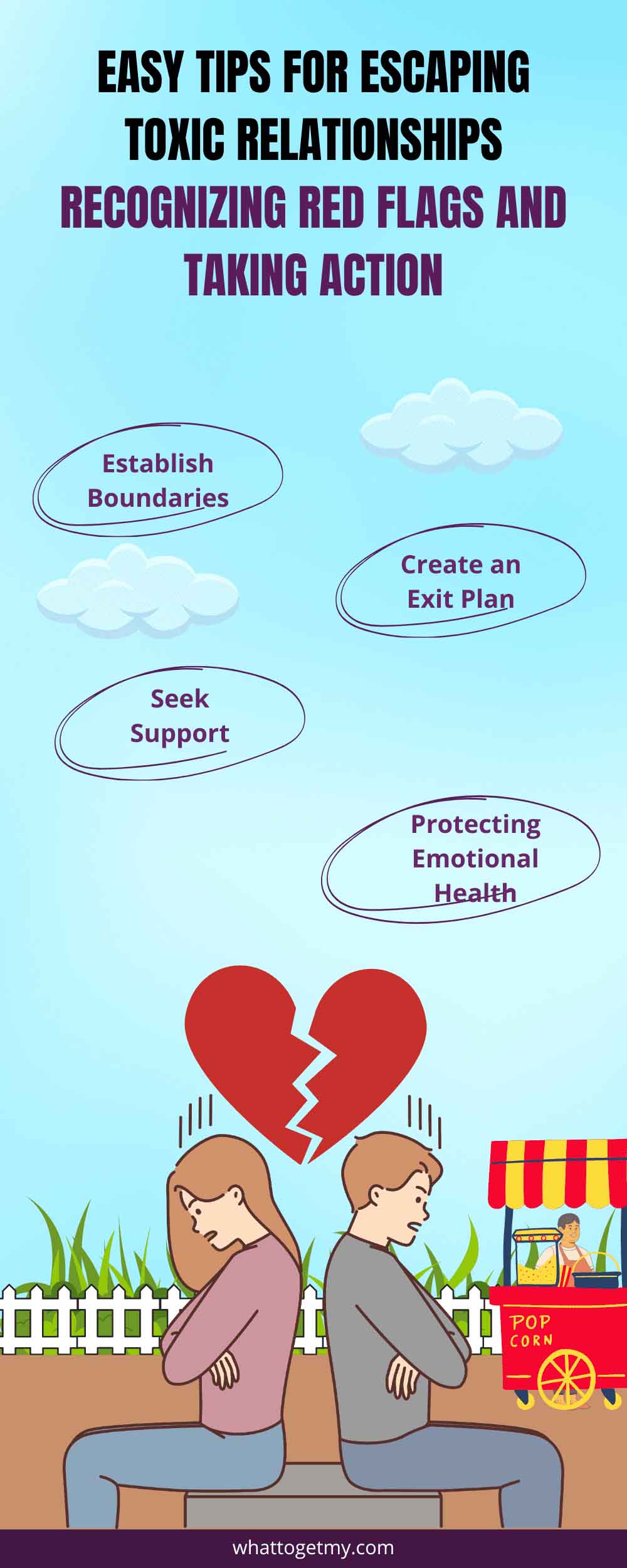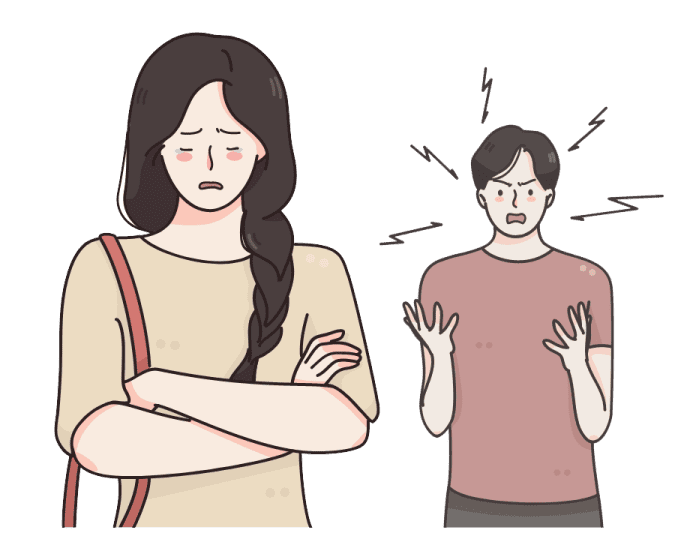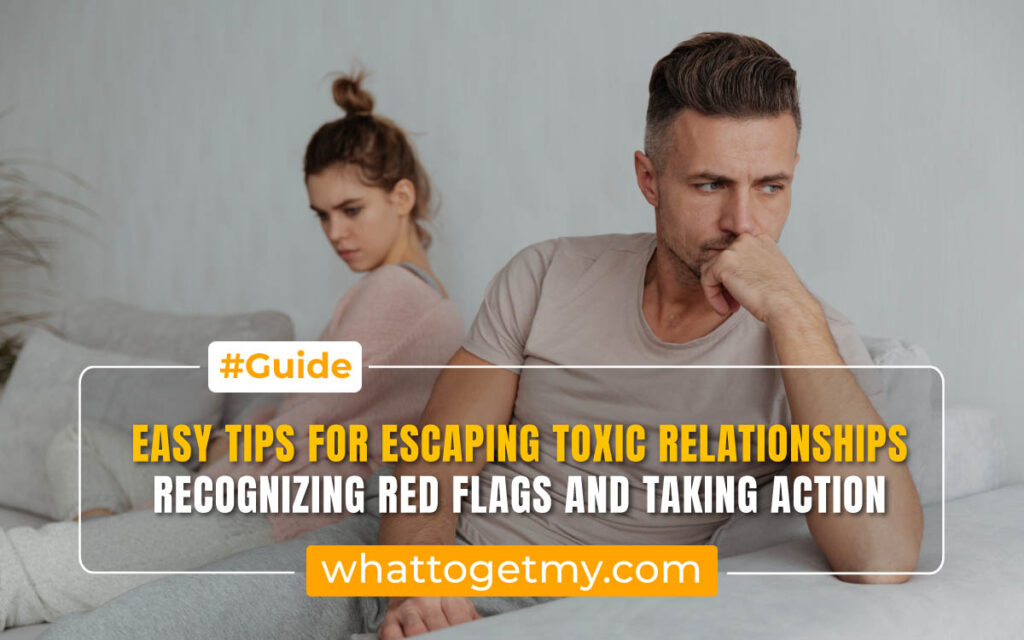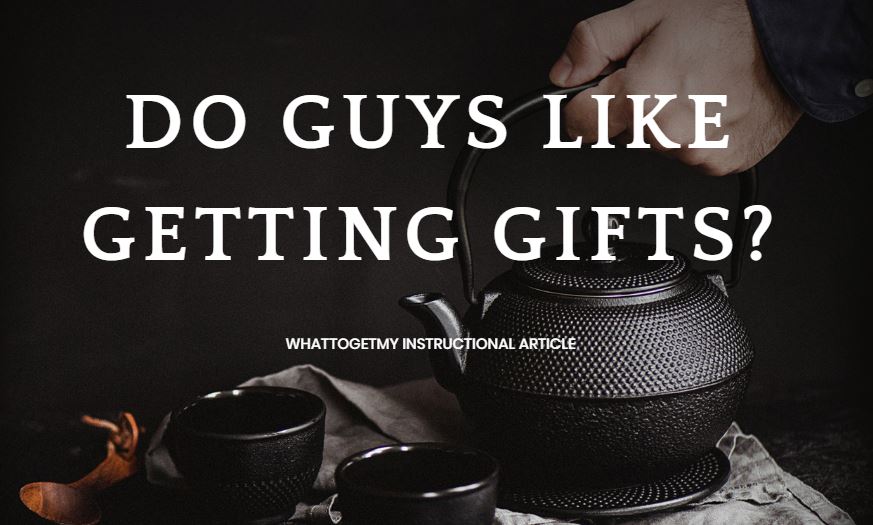3 Easy Tips For Escaping Toxic Relationships: Recognizing Red Flags and Taking Action. A Guide (2023)
Toxic relationships can be detrimental to our well-being and happiness.
Manipulation is a general characteristic observed in toxic relationships, where individuals employ manipulative tactics to exert control and power over their partners or others involved.
Constant criticism is a distressing characteristic often present in toxic relationships, where relentless belittlement and demeaning remarks undermine the victim’s self-esteem and confidence.
Online communities and forums dedicated to survivors of toxic relationships can also provide a safe space for sharing experiences, finding support, and connecting with others who have gone through similar situations.
This rollercoaster of emotions can leave you confused, anxious, and constantly on edge.
Toxic relationships can be detrimental to our well-being and happiness. Recognizing red flags and taking action to escape from them is crucial for our personal growth and emotional health. In this article, we will explore the red flags that indicate a toxic relationship and provide strategies for taking the necessary steps to break free from its grip. Understanding toxic relationships’ dynamics and empowering ourselves with knowledge can create a path toward healthier and more fulfilling connections.
Understanding Toxic Relationships
Toxic relationships are characterized by unhealthy patterns of behavior that erode trust, respect, and emotional well-being. They can take various forms, such as emotional abuse, manipulation, control, and constant negativity. Recognizing these red flags is the first step in acknowledging that you are in a toxic relationship. Some common signs of toxic behavior include:
1. Lack of respect: In a toxic relationship, there is a lack of mutual respect and consideration for each other’s boundaries and feelings.
In toxic relationships, the presence of a disregard for respect becomes apparent. Such relationships lack the fundamental element of mutual respect, where both individuals fail to acknowledge and honor each other’s boundaries, emotions, and needs. This absence of respect can manifest in various ways, such as dismissive or derogatory comments, belittling behaviors, or intentionally crossing personal boundaries. In toxic dynamics, one person often asserts power and control over the other, disregarding their autonomy and treating them with contempt. Recognizing this lack of respect is crucial in understanding the toxic nature of the relationship and taking steps to address it. Establishing healthy boundaries and seeking support are vital in breaking free from the cycle of disrespect and fostering relationships based on mutual respect and consideration.
2. Manipulation: Toxic individuals often manipulate others to gain control and power over them. They may use guilt, gaslighting, or emotional blackmail as tactics.
Manipulation is a general characteristic observed in toxic relationships, where individuals employ manipulative tactics to exert control and power over their partners or others involved. Considered among the red flags in relationships, toxic individuals may employ various manipulative techniques, such as guilt-tripping, gaslighting, and emotional blackmail, in their pursuit of dominance. They skillfully exploit vulnerabilities and insecurities to manipulate their victims’ emotions, thoughts, and actions. Gaslighting, for instance, involves distorting reality, making the other person question their sanity, and undermining their perception of events. Emotional blackmail involves using threats, emotional manipulation, or manipulation of feelings to coerce compliance or control. Recognizing these manipulative behaviors is crucial in understanding the relationship’s toxicity and taking proactive steps to protect oneself. Building self-awareness, setting boundaries, and seeking support from trusted individuals or professionals are essential in breaking free from the manipulative grip, escaping toxic partnerships, and fostering healthier connections based on trust and respect.
3. Constant criticism: Toxic partners engage in a pattern of constant criticism, belittlement, and demeaning remarks that undermine your self-esteem.
Constant criticism is a distressing characteristic often present in toxic relationships, where relentless belittlement and demeaning remarks undermine the victim’s self-esteem and confidence. Toxic partners habitually criticize and find fault in almost every aspect of their partner’s life, including appearance, intelligence, abilities, and choices. These are all signs of toxic behavior in relationships.
They aim to diminish the other person’s self-worth, making them feel inadequate and powerless. This constant barrage of negativity affects the victim’s emotional well-being and can lead to feelings of worthlessness, anxiety, and depression. It is essential to recognize this destructive behavior as a red flag of toxicity and take steps to protect oneself. Developing a solid sense of self-worth, surrounding oneself with supportive and uplifting individuals, and seeking professional help if needed are crucial in breaking free from the cycle of constant criticism and rebuilding a positive self-image. Remember, you deserve to be treated with respect and kindness.
4. Isolation: Toxic individuals may isolate you from friends, family, or support networks, making you dependent on them for validation and companionship.
Isolation is a common tactic toxic individuals employ to control and maintain power over their victims. By isolating you from your friends, family, or support networks, they create a sense of dependency, making you rely solely on them for validation, companionship, and emotional support. They may intentionally discourage or undermine your relationships with others, manipulate situations to keep you away from loved ones, or create a hostile environment discouraging external connections.
This isolation serves multiple purposes for the toxic individual. Firstly, it limits your access to alternative perspectives, making it easier for them to manipulate and control you without interference. Secondly, it creates a sense of loneliness and vulnerability, eroding your self-confidence and making you more reliant on their presence and approval.
Recognizing this red flag of isolation is crucial in breaking free from and ending toxic relationships. Contact trusted friends, family, or professionals who can support and help you regain your independence. Rebuilding a support network and reconnecting with loved ones will provide emotional support and a safe space to discuss your experiences and gain valuable insights.
Remember, building healthy relationships is not rocket science. You deserve healthy, fulfilling relationships that respect your autonomy and foster personal growth.
5. Emotional volatility: Toxic relationships are often marked by intense emotional highs and lows, creating an unstable and unpredictable environment.
Emotional volatility is a crucial characteristic of toxic relationships. These relationships are often characterized by extreme emotional swings, creating an atmosphere of instability and unpredictability. One moment, the toxic individual may shower you with affection, love, and attention, making you feel cherished and valued. However, this can quickly shift to explosive anger, jealousy, or irrational behavior.
This rollercoaster of emotions can leave you confused, anxious, and constantly on edge. It is a clear sign of emotional abuse in relationships. You may constantly walk on eggshells to avoid triggering the toxic individual’s adverse reactions. The emotional turmoil can profoundly impact your mental and emotional well-being, leading to stress, anxiety, and a loss of self-confidence.
It’s important to recognize this red flag of emotional volatility and understand that a healthy relationship should provide stability, consistency, and emotional security. If you are in constant emotional turmoil, it may indicate that you are in a toxic relationship.
Taking action to address this issue is crucial for your well-being. This can include setting boundaries, seeking support from trusted friends or professionals, and ultimately, considering the possibility of leaving the toxic relationship. Remember, you deserve to be in a relationship where your emotions are respected, and your well-being is prioritized.
Recognizing unhealthy relationships and these red flags is essential for your well-being and the first step towards escaping a toxic relationship.
The graph below from 2018 in the United Kingdom showcases the prevalence of workplace rivalry related to co-worker attributes. The majority of respondents expressed concerns regarding colleagues who share the same age and gender, indicating a lower likelihood of developing animosity towards individuals of different genders or younger age groups, according to Statista.

Taking Action: Breaking Free from Toxic Relationships
Once you have recognized the signs of a toxic relationship, it’s time to take action and reclaim your life. Here are strategies to help you navigate this challenging journey:
1. Establish boundaries: Set clear boundaries with the toxic individual and communicate them assertively. Be firm in enforcing these boundaries to protect yourself from further harm.
Establishing boundaries is a vital step in dealing with toxic relationships. When you set clear boundaries, you define acceptable and unacceptable behavior from the toxic individual. It establishes a framework for how you expect to be treated and what you will not tolerate.
To establish boundaries effectively, identify your needs, values, and limits. Reflect on what is important to you and the behaviors that cross the line. Once you clearly understand your boundaries, communicate them assertively to the toxic individual. Use “I” statements to express your feelings and needs without blaming or accusing them. For example, say, “I feel uncomfortable when you raise your voice. I need you to speak to me respectfully.”
Enforcing boundaries is equally important. Be firm and consistent in upholding your boundaries. If the toxic individual violates your boundaries, calmly and assertively remind them of your expectations. Use consequences if necessary to reinforce the importance of respecting your boundaries. For example, you may disengage from the conversation or temporarily distance yourself from the relationship if the toxic behavior continues.

Remember that setting and enforcing boundaries is not about changing the toxic individual’s behavior. It is about taking action in toxic relationships. It is about protecting yourself from toxic people and creating a safe space for your well-being. Stay committed to your boundaries and be prepared to take further action if the toxic individual consistently disrespects them. Surround yourself with a support system of trusted friends and professionals who can provide guidance and encouragement as you navigate this challenging process.
Setting boundaries can be difficult, especially in toxic relationships where the individual may push back or attempt to manipulate you. Stay strong and prioritize your own emotional and mental health. You deserve relationships that respect your boundaries and contribute positively to your well-being.
2. Seek support: Reach out to trusted friends, family, or professionals who can provide emotional support and guidance throughout the process of ending the toxic relationship.
Seeking support is crucial when dealing with a toxic relationship. Having a network of trusted individuals who can provide emotional support, guidance, and perspective during this challenging time is essential.
Contact friends and family members you trust and feel comfortable discussing your situation. Share your experiences and feelings with them, and listen to their insights and advice. Their outside perspective can help you gain clarity and validate your emotions.
Consider seeking professional support from therapists, counselors, or support groups specializing in toxic relationships. These professionals have the expertise to help you navigate the complexities of ending a toxic relationship and can provide valuable guidance tailored to your specific situation. They can offer coping strategies, assist with emotional healing, and support you in building a healthier future.
Online communities and forums dedicated to survivors of toxic relationships can also provide a safe space for sharing experiences, finding support, and connecting with others who have gone through similar situations. These communities can offer empathy, validation, and practical advice from individuals who know firsthand what you’re going through.
Remember, seeking support is not a sign of weakness but a strength. It takes courage to reach out and acknowledge that you need assistance. Surrounding yourself with a supportive network can help you stay motivated, maintain your emotional well-being, and encourage you to end a toxic relationship.
However, ensure that you choose your support system wisely. Avoid sharing your plans with individuals who may inadvertently or intentionally undermine your decision to leave the toxic relationship. Seek out those who are understanding, non-judgmental, and supportive of your journey toward a healthier and happier life.
You don’t have to face the challenges of ending a toxic relationship alone. Seek support from trusted individuals with your best interests at heart, and let them help you navigate this complicated process with compassion and understanding. Remember, you deserve to be in relationships that uplift and nurture your well-being.
3. Create an exit plan: Develop a plan to safely exit the toxic relationship, considering practical aspects such as housing, finances, and legal matters if necessary.
Creating an exit plan is crucial when ending a toxic relationship. It involves carefully considering practical aspects to ensure safety, well-being, and a smooth transition to a healthier life. Here are some steps to help you develop an exit plan:
i. Assess your safety: Prioritize your safety above all else. Contact local authorities or helplines for assistance if you feel in immediate danger. Create a safety plan that includes emergency contact numbers, a safe place to go, and a discreet way to communicate with others if needed.
ii. Secure your finances: Financial independence is essential when leaving a toxic relationship. Take stock of your financial situation and gather important documents such as identification papers, bank statements, and insurance policies. Open a separate bank account if necessary and start saving money to support yourself during the transition.
iii. Identify a safe place to stay: Find a safe and supportive environment where you can stay temporarily. This could be with friends, family, or a shelter if needed. Ensure the location is confidential and that the toxic individual cannot quickly locate you.
iv. Create a support network: Contact trusted friends, family, or professionals who can provide emotional support and practical assistance. Inform them about your situation and your plan to leave the toxic relationship. They can offer guidance, help with logistics, and provide stability during this challenging time.
v. Seek legal advice if necessary: Depending on the circumstances, it may be necessary to seek legal advice to protect your rights and ensure a smooth separation. Consult a lawyer experienced in family law or domestic violence to understand your options and rights.
vi. Develop a communication strategy: Determine how you will communicate your decision to end the relationship with the toxic individual. This may involve setting boundaries, utilizing a mediator, or involving law enforcement if necessary. Keep documentation of any abusive incidents or threats for future reference.
vii. Build a support system:
Your exit plan should prioritize your safety and well-being as you embark on a new chapter of your life.
4. Focus on self-care: Prioritize self-care activities that promote your physical, emotional, and mental well-being. Engage in activities that bring you joy, reduce stress, and boost your self-esteem.
Self-care is crucial when ending a toxic relationship. Prioritizing your well-being can help you heal, rebuild your strength, and create a positive foundation for the future. Here are some self-care practices to consider:
i. Physical self-care: Take care of your physical health by exercising regularly, getting enough sleep, and maintaining a balanced diet. Physical well-being is closely connected to emotional well-being, so prioritize activities that nourish your body.
ii. Emotional self-care: Allow yourself to process your emotions and practice self-compassion. Journaling, therapy, or support groups can provide a safe space to express your feelings and gain valuable insights. Surround yourself with positive influences and engage in joyful and peaceful activities.
iii. Mental self-care: Nurture your mental well-being by engaging in activities stimulate your mind and promote relaxation. This could include reading, practicing mindfulness or meditation, engaging in hobbies or creative pursuits, or learning new skills. Take breaks when needed and give yourself permission to rest and recharge.
iv. Establish healthy boundaries: Set clear boundaries with others, including the toxic individual, to protect your emotional well-being. Learn to say no to requests or situations that compromise your mental health. Prioritize your needs and create a supportive environment that respects and honors your boundaries.
v. Seek support: Surround yourself with a robust support system of friends, family, or support groups who can provide encouragement and understanding. Consider seeking professional help, such as therapy or counseling, as you go through the healing process. Feel free to reach out for support when you need it.

vi. Practice self-compassion: Be kind and gentle with yourself as you navigate the healing process. Acknowledge your strengths and achievements, and forgive yourself for any perceived shortcomings. Treat yourself with the same compassion and understanding you offer a close friend.
vii. Engage in activities you enjoy: Rediscover activities that bring you joy and fulfillment. Engage in hobbies, spend time in nature, listen to music, practice self-expression through art, or engage in any activity that helps you feel alive and connected to yourself.
Remember, self-care is not selfish but a vital part of your healing journey. By prioritizing your well-being, you can regain your strength, rebuild your life, and create a healthier and more fulfilling future. Be patient with yourself and celebrate every step forward on your path to healing and self-discovery.
5. Build a support network: Surround yourself with positive and supportive individuals who uplift and validate you. Cultivate healthy relationships that contribute to your growth and happiness. Give your attention to positive influences and engage in self-care activities. This can include therapy or counseling to heal from the emotional trauma of the toxic relationship. Focus on rebuilding your self-esteem and regaining your independence.
Protecting Your Emotional Health
Ending a toxic relationship is not the end of the journey; it’s the beginning of a new chapter in your life. Here are some steps to protect your emotional well-being and heal from the effects of a toxic relationship:

1. Practice self-reflection: Take time to reflect on the patterns and dynamics of the toxic relationship. Understand any underlying vulnerabilities or patterns that may have attracted you to the toxic individual.
2. Seek therapy: Consider seeking professional help through therapy or counseling. A therapist can provide guidance, support, and tools to help you heal and rebuild your life after a toxic relationship.
3. Practice self-compassion: Be kind to yourself and practice self-compassion as you navigate the healing process. Understand that healing takes time, and allow yourself to grieve and process the emotions associated with the toxic relationship.
4. Focus on personal growth: Use the experience as an opportunity for personal growth and self-improvement. Engage in activities that promote self-discovery, self-care, and self-love
Frequently Asked Questions
1. How can I recognize the red flags of a toxic relationship?
– Red flags of a toxic relationship may include constant criticism, manipulation, lack of respect for boundaries, isolation from loved ones, and emotional volatility. Pay attention to patterns of behavior that consistently make you feel drained, anxious, or unhappy. Trust your instincts and seek support if you suspect you are in a toxic relationship.
2. How do I gather the courage to leave a toxic relationship?
– Leaving a toxic relationship can be challenging, but remember that your well-being is essential. Start by acknowledging the toxicity and understanding that you deserve better. Seek support from trusted friends, family, or professionals. Develop exit plan that prioritizes your safety and takes small steps towards reclaiming your independence.
3. What steps can I take to rebuild my life after leaving a toxic relationship?
– Rebuilding your life after leaving a toxic relationship is a process that requires patience and self-care. Focus on self-healing by practicing self-compassion, engaging in therapy or counseling, and investing in activities that bring you joy. Surround yourself with a supportive network and consider joining support groups to connect with others who have had similar experiences. Take things at your own pace and celebrate each milestone as you create a healthier and happier future.
Remember, seeking professional help is crucial in navigating the complexities of toxic relationships. These questions and answers provide general guidance, but each situation is unique, and it’s essential to tailor your actions to your specific circumstances.
Conclusion
Considering all factors, it is clear that escaping a toxic relationship requires courage, self-awareness, and a commitment to your own well-being. By recognizing the red flags and taking decisive action, you can free yourself from toxic relationships and create a healthier and happier future. Remember, you deserve to be in a relationship based on mutual respect, trust, and support. Take the necessary steps to break free and embrace a life of positivity, love, and fulfillment.
01 HOURS 59 MINUTES
ESTIMATED TIME DESIGNING AND UPLOADING THIS ARTICLE
08 HOURS 48 MINUTES
ESTIMATED TIME RESEARCHING AND WRITING THIS ARTICLE
LOOKING FOR MORE GIFTS?
Try our AMAZING GIFT FINDER TOOL! Find GIFTS with 1 CLICK!
LOOKING FOR MORE GIFTS?
Try our AMAZING GIFT FINDER TOOL! Find GIFTS with 1 CLICK!
LOOKING FOR MORE GIFTS?
Try our AMAZING GIFT FINDER TOOL! Find GIFTS with 1 CLICK!
You Might Also Like

11 Cool Things to Have in Your Room for Guys
Looking for things to have in your room for guys? Good, because it’s time we told ourselves: decorating a room isn’t just a woman’s issue. Men also don’t really need it. We’ll always find some to say, “Ah, what’s the point! A few useful accessories

How to Celebrate Your Husband’s Birthday Differently
How to Celebrate Your Husband’s Birthday Differently WhatToGetMy Instructional Article You’re probably wondering how to celebrate your husband’s birthday differently. In the last couple of years, you were having a typical birthday celebration for your husband and now you want to change something. It doesn’t

17 Cognitive Development Activities for 6-12 Years Olds
17 Cognitive Development Activities for 6-12 Years Olds WhatToGetMy Instructional Article Middle childhood is an important time in a child’s life where foundational skills are developed. It is equally a good time to engage children with remedial activities that will help them to improve in

19 Exciting Things to Do for a 30th Birthday
19 Exciting Things to Do for a 30th Birthday WhatToGetMy Instructional Article How do you feel about turning 30 in a bit? Amazing right?! While you might be missing your ‘20s, your ‘30s can be way better. For many people, their 30’s gifts them a

5 Ideas for a Cheap but Classy Wedding Reception
5 Ideas for a Cheap but Classy Wedding Reception WhatToGetMy Instructional Article With the rising costs of weddings in the United States, throwing a wedding together without overspending seems impossible. However, there are many ways to provide a beautiful and classy wedding reception on a

5 Signs You’re a Bad Mother WhatToGetMy Instructional Article For the purposes of this article, we will define a bad mom as someone who deliberately inflicts psychological, physical, and emotional pain on their child while also neglecting and abusing them. This article will look at

How Do You Know when to Leave a Marriage – 23 Signs that It May Be Time to Call It Quits.
How Do You Know when to Leave a Marriage – 23 Signs that It May Be Time to Call It Quits. WhatToGetMy Instructional Article Several studies have shown that a lot of married people think about divorce especially when they have been married for less

How to Make Him Forget the Other Woman
How to Make Him Forget the Other Woman WhatToGetMy Instructional Article There’s no single (right) answer to the question of how to make your man forget the other woman. It’s a tough one that demands a lot of thinking. Each relationship is different, and each

How to Plan a Wedding With Step by Step Instructions
How to Plan a Wedding With Step-By-Step Instructions WhatToGetMy Instructional Article Just got engaged and want to know how to plan a wedding with step-by-step instructions while trying to keep your stress level to a minimum. For some people planning their own wedding is the

What To Get a Man Who Wants Nothing
Trying to come up with gifts for men can be a really difficult task especially if the man claims he has everything he desires. You will be left wondering what to get a man who wants nothing, that will really surprise him and simplify or



